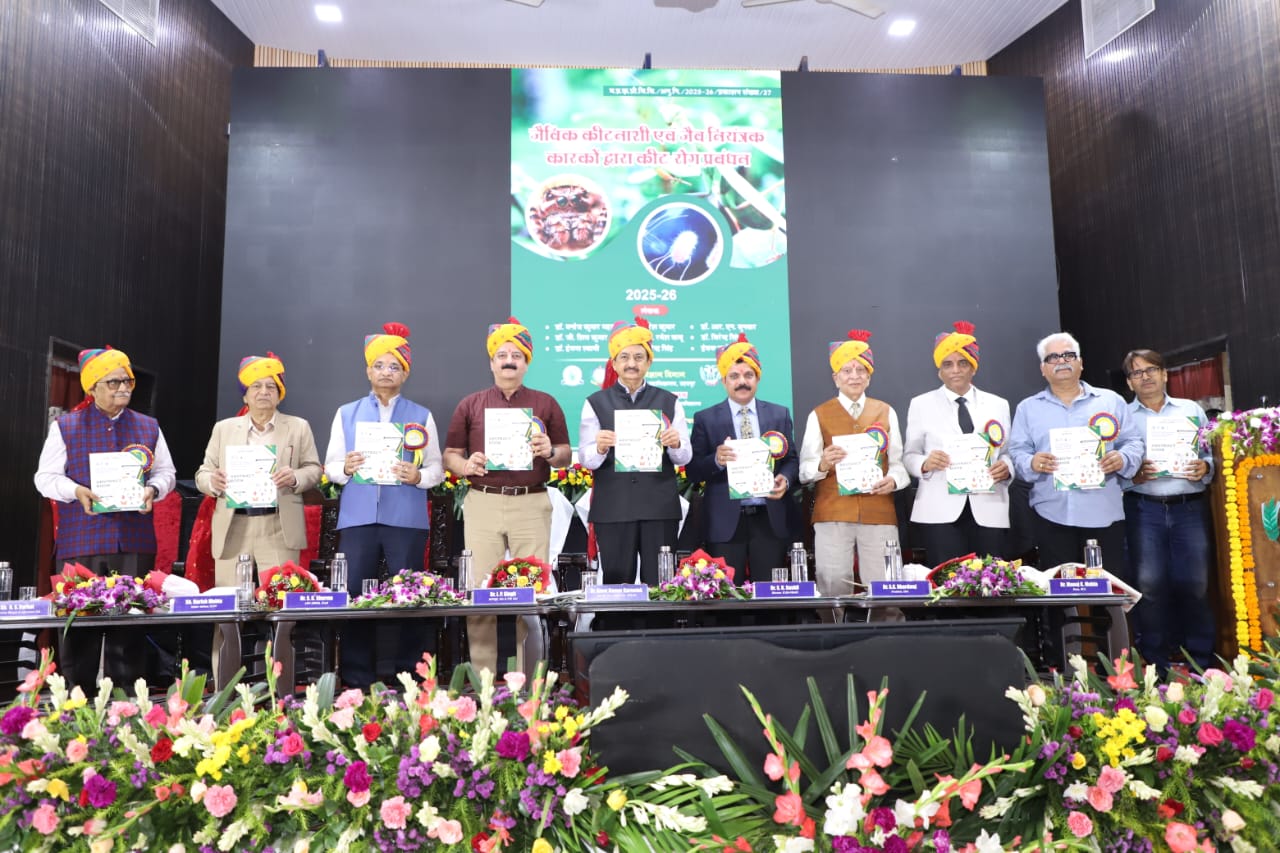#### National Conference on “Advances in Sustainable Plant Protection in Changing Agricultural Scenario” Inaugurated
Need for Natural Pest Control Research – Chaudhary

Udaipur – Union Minister of State for Agriculture and Farmers’ Welfare, Bhagirath Chaudhary, called upon agricultural scientists to intensify research on natural pest control techniques that can be integrated into natural farming practices. He emphasized that such innovations would prevent unnecessary financial burdens on farmers caused by the purchase of pesticides and fungicides.

The Minister was addressing the inaugural session of the three-day national conference on “Advances in Sustainable Plant Protection in Changing Agricultural Scenario” on Thursday at Rajasthan College of Agriculture, Udaipur. The event is jointly organized by Maharana Pratap University of Agriculture and Technology (MPUAT), Entomological Research Association, and Crop Care Federation of India, New Delhi. Over 400 agricultural scientists, researchers, and industry representatives from 18 states are participating.
Speaking online, Chaudhary highlighted that in today’s changing climatic conditions, farmers’ foremost concern is the safe arrival of crops from seed germination to harvest. He stressed the need for eco-friendly plant protection strategies that reduce excessive chemical use while ensuring environmental sustainability.
Presiding over the session, MPUAT Vice-Chancellor Dr. Ajit Kumar Karnataka said the conference would contribute significantly to policy formation for achieving the goals of a developed India. Tracing the history, he noted that the Entomological Research Association was established in 1985 at the Department of Entomology, Rajasthan College of Agriculture, which itself was founded in 1957 by eminent entomologist Dr. K.S. Kushwaha.
Dr. Karnataka underlined that agriculture remains the backbone of India’s economy, contributing nearly 18% to GDP and providing livelihoods to over 45% of the population. Ensuring food and nutritional security for 1.46 billion people amid shrinking arable land is a formidable challenge. Sustainable farming, he said, is not an option but a necessity. He urged scientists and policymakers to prepare a roadmap for agriculture with a vision of Developed India 2047, focusing on coarse cereals, pulses, oilseeds, millets, and vegetables, alongside drought and pest-resistant crops. He also highlighted the success of MPUAT’s Pratap Hybrid Maize-6, which yields 60–65 quintals per hectare, nearly double the national average.
Expert Insights
Special guests including Dr. J.P. Singh (Plant Protection Advisor, Govt. of India), Dr. S.N. Sushil (Director, NBAIR, Bengaluru), Dr. Harish Mehta (Senior Advisor, CCFI, New Delhi), Dr. S.K. Sharma (ADG-HRD, ICAR, New Delhi), Dr. S.C. Bhardwaj (President, Entomological Research Association, Udaipur), and industry leader N.S. Barhat addressed the gathering. They underscored the critical role of pest management in enhancing productivity and farmers’ income to meet the vision of Developed India 2047.
Experts pointed out that while chemical use in agriculture accounts for 53% of cultivable land, 10% combines chemicals and bio-inputs, 6% relies solely on bio-inputs, and the remaining 31% uses neither. Despite relatively low pesticide use compared to global averages, India faces rising challenges from invasive pests—19 new species identified in the last decade compared to just 11 in the preceding century, largely due to agricultural imports.
Speakers stressed that educating farmers on correct pesticide dosage and timing remains crucial. Companies are conducting training programs through their distributors, ensuring farmers benefit from GST reductions on agrochemicals. With new pests constantly emerging, farmers were urged to promptly report outbreaks to scientists for timely interventions.
Awards and Recognitions
The conference honored 40 scientists, researchers, and industry representatives for their contributions to plant protection. Notably, Padma Bhushan Dr. Rajendra Singh Paroda, Chairman of TAAS, New Delhi, received the Indian Agriculture Glory Award, while MPUAT Vice-Chancellor Dr. Ajit Kumar Karnataka was felicitated with the Rajasthan Krishi Ratna Award. Several eminent experts including Dr. Anil Kumar, Dr. J.P. Singh, Dr. S.N. Sushil, Dr. S.K. Sharma, Dr. O.P. Gill, Dr. Amar Nath Sharma, Dr. Poonam Srivastava, Dr. Srinivas Babu Kurra, Dr. Ajit Chahal, Dr. Anand Jha, Dr. Harish Mehta, Dr. K.N. Singh, Dr. Sushil Kumar Mishra, N.S. Barhat, Dr. R.G. Agarwal, Dr. Ravinder Singh, Neeraj Yadav, Dr. P.K. Chakravarti, Dr. Manish Jain, and K.S. Tyagrajan were also recognized.
Release of Technical Publications
During the program, three technical publications authored by MPUAT scientists were released. These included two bulletins – Pest and Disease Management through Biopesticides and Biocontrol Agents and Advanced Tomato Cultivation – along with a technical folder on Production and Use of Trichoderma Bio-Fungicide.
The inaugural session began with a welcome address by Organizing Secretary and Dean, Dr. Manoj Kumar Mahla, who outlined the technical sessions scheduled over three days. The vote of thanks was delivered by Dr. S. Ramesh Babu, while Dr. Vishakha Bansal conducted the proceedings.
साभार :
© CopyRight Pressnote.in | A Avid Web Solutions Venture.






